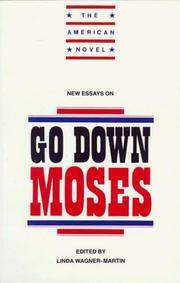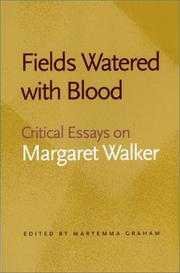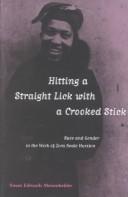| Listing 1 - 10 of 80 | << page >> |
Sort by
|

ISBN: 052145431X 0521456096 0511624565 0511884710 Year: 1996 Publisher: Cambridge Cambridge University Press
Abstract | Keywords | Export | Availability | Bookmark
 Loading...
Loading...Choose an application
- Reference Manager
- EndNote
- RefWorks (Direct export to RefWorks)
Go Down, Moses (1942) came to fruition during the Second World War, was written during one of Faulkner's most traumatic periods, and has fallen to critical neglect amid the vast scholarship on the great Southern writer. In part, this collection aims to tilt the balance, forcing the reader beyond critical commonplaces through asking challenging questions. The five essays assembled here explore the tensions of race and gender apparent throughout the novel. Judith Sensibar approaches the work through Faulkner's relationship with Caroline Barr, the black woman who was his primary caretaker in life; Judith Wittenberg offers an ecological reading; John T. Matthews redefines the novel as a 'Southern' experience; Minrose Gwin focuses on the spaces in the text occupied by black women characters; and Thadious M. Davis charts further complications of the black-white relationships that lie at the heart of the novel.
Faulkner, William --- Arts and Humanities --- Literature --- African American women in literature. --- Race relations in literature. --- Afro-American women in literature --- Faulkner, William, --- Southern States --- In literature.
Book
ISBN: 0813021774 9780813021775 Year: 1999 Publisher: Gainesville University Press of Florida
Abstract | Keywords | Export | Availability | Bookmark
 Loading...
Loading...Choose an application
- Reference Manager
- EndNote
- RefWorks (Direct export to RefWorks)
Women and literature --- African American women in literature --- African Americans in literature --- English --- Languages & Literatures --- American Literature --- Afro-Americans in literature --- Negroes in literature --- Afro-American women in literature --- History --- Naylor, Gloria --- Criticism and interpretation.
Book
ISBN: 0813934486 0813934494 9780813934495 9780813934471 0813934478 9780813934488 1299468314 9781299468313 Year: 2013 Publisher: Charlottesville University of Virginia Press
Abstract | Keywords | Export | Availability | Bookmark
 Loading...
Loading...Choose an application
- Reference Manager
- EndNote
- RefWorks (Direct export to RefWorks)
African American women --- National characteristics, American, in literature. --- African American women in literature. --- American fiction --- Afro-American women --- Women, African American --- Women, Negro --- Women --- Afro-American women in literature --- Employment --- In literature. --- Women authors --- History and criticism. --- African American authors

ISBN: 0820346985 9780820346984 1306827418 9781306827416 9780820338866 0820338869 0820322547 Year: 2001 Publisher: Athens, GA University of Georgia Press
Abstract | Keywords | Export | Availability | Bookmark
 Loading...
Loading...Choose an application
- Reference Manager
- EndNote
- RefWorks (Direct export to RefWorks)
Representing an international gathering of scholars, Fields Watered with Blood constitutes the first critical assessment of the full scope of Margaret Walker's literary career. As they discuss Walker's work, including the landmark poetry collection For My People and the novel Jubilee, the contributors reveal the complex interplay of concerns and themes in Walker's writing: folklore and prophecy, place and space, history and politics, gender and race. In addition, the contributors remark on how Walker's emphases on spirituality and on dignity in her daily life make themselves felt in her writin
Women and literature --- African Americans in literature. --- African American women in literature. --- Afro-Americans in literature --- Negroes in literature --- Afro-American women in literature --- History --- Walker, Margaret, --- Criticism and interpretation. --- Alexander, Margaret Abigail Walker,
Book
ISBN: 0813050243 0813048877 9780813048871 9780813050249 9780813049823 0813049822 Year: 2014 Publisher: Gainesville
Abstract | Keywords | Export | Availability | Bookmark
 Loading...
Loading...Choose an application
- Reference Manager
- EndNote
- RefWorks (Direct export to RefWorks)
Using feminist and womanist theory, Alexander takes as her main point of analysis works that focus on the black female body as the physical and metaphorical site of migration, in the process successfully demonstrating that diaspora has a different meaning for women than men.

ISBN: 0817386939 9780817386931 0817311319 9780817311315 Year: 1999 Publisher: Tuscaloosa : University of Alabama Press,
Abstract | Keywords | Export | Availability | Bookmark
 Loading...
Loading...Choose an application
- Reference Manager
- EndNote
- RefWorks (Direct export to RefWorks)
This comprehensive study examines the ways Hurston circumvented the constraints of the white publishing world and a predominantly white readership to critique white culture and its effects on the black community. Hitting a Straight Lick with a Crooked Stick is the first single-authored book-length study of Zora Neale Hurston and provides the most thorough and meticulous examination of her full body of work. A number of earlier critics have concluded that Hurston simply capitulated to external demands, writing stories white people wanted to hear. Susan Edward
Sex role in literature. --- Race relations in literature. --- African Americans in literature. --- African American women in literature. --- Women and literature --- Afro-American women in literature --- Afro-Americans in literature --- Negroes in literature --- History --- Hurston, Zora Neale --- Criticism and interpretation.
Book
ISBN: 1611173671 9781611173673 9781611173666 1611173663 Year: 2014 Publisher: Columbia, South Carolina
Abstract | Keywords | Export | Availability | Bookmark
 Loading...
Loading...Choose an application
- Reference Manager
- EndNote
- RefWorks (Direct export to RefWorks)
In this revised introduction to Nobel Laureate Toni Morrison’s novels, Jan Furman extends and updates her critical commentary. New chapters on four novels following the publication of Jazz in 1992 continue Furman’s explorations of Morrison’s themes and narrative strategies. In all Furman surveys ten works that include the trilogy novels, a short story, and a book of criticism to identify Morrison’s recurrent concern with the destructive tensions that define human experience: the clash of gender and authority, the individual and community, race and national identity, culture and authenticity, and the self and other. As Furman demonstrates, Morrison more often than not renders meaning for characters and readers through an unflinching inquiry, if not resolution, of these enduring conflicts. She is not interested in tidy solutions. Enlightened self-love, knowledge, and struggle, even without the promise of salvation, are the moral measure of Morrison’s characters, fiction, and literary imagination. Tracing Morrison’s developing art and her career as a public intellectual, Furman examines the novels in order of publication. She also decodes their collective narrative chronology, which begins in the late seventeenth century and ends in the late twentieth century, as Morrison delineates three hundred years of African American experience. In Furman’s view Morrison tells new and difficult stories of old, familiar histories such as the making of Colonial America and the racing of American society. In the final chapters Furman pays particular attention to form, noting Morrison’s continuing practice of the kind of “deep" novelistic structure that transcends plot and imparts much of a novel’s meaning. Furman demonstrates, through her helpful analyses, how engaging such innovations can be.
African Americans in literature. --- African American women in literature. --- Women and literature --- Afro-Americans in literature --- Negroes in literature --- Afro-American women in literature --- History --- Morrison, Toni --- Criticism and interpretation. --- Wofford, Chloe Anthony --- Morrisonová, Toni --- מוריסון, טוני
Book
ISBN: 1282594214 9786612594212 9042028912 1441606513 9781441606518 9789042025448 9042025441 9789042028913 Year: 2009 Publisher: Amsterdam New York, NY
Abstract | Keywords | Export | Availability | Bookmark
 Loading...
Loading...Choose an application
- Reference Manager
- EndNote
- RefWorks (Direct export to RefWorks)
Alice Walker's Pulitzer Prize winning novel The Color Purple is a tale of personal empowerment which opens with a protagonist Celie who is at the bottom of America's social caste. A poor, black, ugly and uneducated female in the America's Jim Crow South in the first half of the 20th century, she is the victim of constant rape, violence and misogynistic verbal abuse. Celie cannot conceive of an escape from her present condition, and so she learns to be passive and unemotional. But The Color Purple eventually demonstrates how Celie learns to fight back and how she discovers her true sexuality and her unique voice. By the end of the novel, Celie is an empowered, financially-independent entrepreneur/landowner, one who speaks her mind and realizes the desirability of black femaleness while creating a safe space for herself and those she loves. Through a journey of literary criticism, Dialogue: Alice Walker's The Color Purple follows Celie's transformation from victim to hero. Each scholarly essay becomes a step of the journey that paves the way for the development of self and sexual awareness, the beginnings of religious transformation and the creation of nurturing places like home and community.
Book
ISBN: 1847602878 9781847602879 9781847603272 1847603270 Year: 2013 Publisher: Penrith [Cumbria] : Humanities-Ebooks, LLP,
Abstract | Keywords | Export | Availability | Bookmark
 Loading...
Loading...Choose an application
- Reference Manager
- EndNote
- RefWorks (Direct export to RefWorks)
Historical fiction, American --- African American women in literature. --- Infanticide in literature. --- Slavery in literature. --- Slavery and slaves in literature --- Slaves in literature --- Afro-American women in literature --- History and criticism. --- Morrison, Toni, --- Morrison, Toni. --- Morrison, Toni --- Enslaved persons in literature
Book
ISBN: 1438462441 1438462433 9781438462448 9781438462431 9781438462424 1438462425 Year: 2016 Publisher: Albany, New York : SUNY Press,
Abstract | Keywords | Export | Availability | Bookmark
 Loading...
Loading...Choose an application
- Reference Manager
- EndNote
- RefWorks (Direct export to RefWorks)
Since the Black women's literary renaissance ended nearly three decades ago, a profitable and expansive market of self-help books, inspirational literature, family-friendly plays, and films marketed to Black women has emerged. Through messages of hope and responsibility, the writers of these texts develop templates that tap into legacies of literacy as activism, preaching techniques, and narrative formulas to teach strategies for overcoming personal traumas or dilemmas and resuming one's quality of lifeDrawing upon Black vernacular culture as well as scholarship in rhetorical theory, literacy studies, Black feminism, literary theory, and cultural studies, Tamika L. Carey deftly traces discourses on healing within the writings and teachings of such figures as Oprah Winfrey, Iyanla Vanzant, T. D. Jakes, and Tyler Perry, revealing the arguments and curricula they rely on to engage Black women and guide them to an idealized conception of wellness. As Carey demonstrates, Black women's wellness campaigns indicate how African Americans use rhetorical education to solve social problems within their communities and the complex gender politics that are mass-produced when these efforts are commercialized.
African American women --- African American women in literature. --- Psychic trauma in literature. --- Healing. --- Curing (Medicine) --- Therapeutics --- Afro-American women in literature --- Afro-American women --- Women, African American --- Women, Negro --- Women --- Intellectual life. --- Psychology.
| Listing 1 - 10 of 80 | << page >> |
Sort by
|

 Search
Search Feedback
Feedback About UniCat
About UniCat  Help
Help News
News